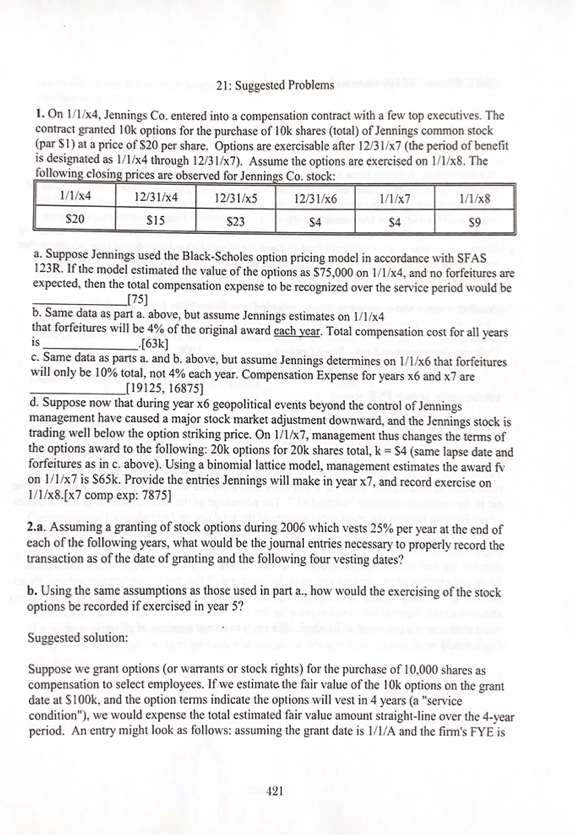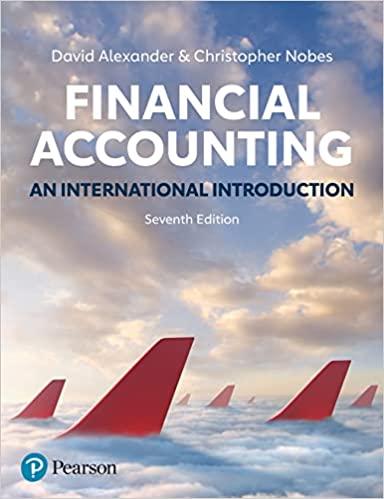Please show how you got the answer.

21: Suggested Problems 1. On 1/1/x4, Jennings Co. entered into a compensation contract with a few top executives. The contract granted 10k options for the purchase of 10k shares (total) of Jennings common stock (par $1 ) at a price of $20 per share. Options are exercisable after 12/31/x7 (the period of benefit is designated as 1/1/x4 through 12/31/x7 ). Assume the options are exercised on 1/1/x8. The following closing prices are observed for Jenninos C stock: a. Suppose Jennings used the Black-Scholes option pricing model in accordance with SFAS 123R. If the model estimated the value of the options as $75,000 on 1/1/x4, and no forfeitures are expected, then the total compensation expense to be recognized over the service period would be 75] b. Same data as part a. above, but assume Jennings estimates on 1/1/x4 that forfeitures will be 4% of the original award each year. Total compensation cost for all years is [63k] c. Same data as parts a. and b. above, but assume Jennings determines on 1/1/x6 that forfeitures will only be 10% total, not 4% each year. Compensation Expense for years x6 and x7 are [19125,16875] d. Suppose now that during year 6 geopolitical events beyond the control of Jennings management have caused a major stock market adjustment downward, and the Jennings stock is trading well below the option striking price. On 1/1/7, management thus changes the terms of the options award to the following: 20k options for 20k shares total, k=$4 (same lapse date and forfeitures as in c. above). Using a binomial lattice model, management estimates the award fv on 1/1/x7 is $65k. Provide the entries Jennings will make in year x7, and record exercise on 1/1/x8.[x7 comp exp: 7875] 2.a. Assuming a granting of stock options during 2006 which vests 25% per year at the end of each of the following years, what would be the journal entries necessary to properly record the transaction as of the date of granting and the following four vesting dates? b. Using the same assumptions as those used in part a., how would the exercising of the stock options be recorded if exercised in year 5 ? Suggested solution: Suppose we grant options (or warrants or stock rights) for the purchase of 10,000 shares as compensation to select employees. If we estimate the fair value of the 10k options on the grant date at $100k, and the option terms indicate the options will vest in 4 years (a "service condition"), we would expense the total estimated fair value amount straight-line over the 4-year period. An entry might look as follows: assuming the grant date is 1/1/A and the firm's FYE is 421 21: Suggested Problems 1. On 1/1/x4, Jennings Co. entered into a compensation contract with a few top executives. The contract granted 10k options for the purchase of 10k shares (total) of Jennings common stock (par $1 ) at a price of $20 per share. Options are exercisable after 12/31/x7 (the period of benefit is designated as 1/1/x4 through 12/31/x7 ). Assume the options are exercised on 1/1/x8. The following closing prices are observed for Jenninos C stock: a. Suppose Jennings used the Black-Scholes option pricing model in accordance with SFAS 123R. If the model estimated the value of the options as $75,000 on 1/1/x4, and no forfeitures are expected, then the total compensation expense to be recognized over the service period would be 75] b. Same data as part a. above, but assume Jennings estimates on 1/1/x4 that forfeitures will be 4% of the original award each year. Total compensation cost for all years is [63k] c. Same data as parts a. and b. above, but assume Jennings determines on 1/1/x6 that forfeitures will only be 10% total, not 4% each year. Compensation Expense for years x6 and x7 are [19125,16875] d. Suppose now that during year 6 geopolitical events beyond the control of Jennings management have caused a major stock market adjustment downward, and the Jennings stock is trading well below the option striking price. On 1/1/7, management thus changes the terms of the options award to the following: 20k options for 20k shares total, k=$4 (same lapse date and forfeitures as in c. above). Using a binomial lattice model, management estimates the award fv on 1/1/x7 is $65k. Provide the entries Jennings will make in year x7, and record exercise on 1/1/x8.[x7 comp exp: 7875] 2.a. Assuming a granting of stock options during 2006 which vests 25% per year at the end of each of the following years, what would be the journal entries necessary to properly record the transaction as of the date of granting and the following four vesting dates? b. Using the same assumptions as those used in part a., how would the exercising of the stock options be recorded if exercised in year 5 ? Suggested solution: Suppose we grant options (or warrants or stock rights) for the purchase of 10,000 shares as compensation to select employees. If we estimate the fair value of the 10k options on the grant date at $100k, and the option terms indicate the options will vest in 4 years (a "service condition"), we would expense the total estimated fair value amount straight-line over the 4-year period. An entry might look as follows: assuming the grant date is 1/1/A and the firm's FYE is 421







